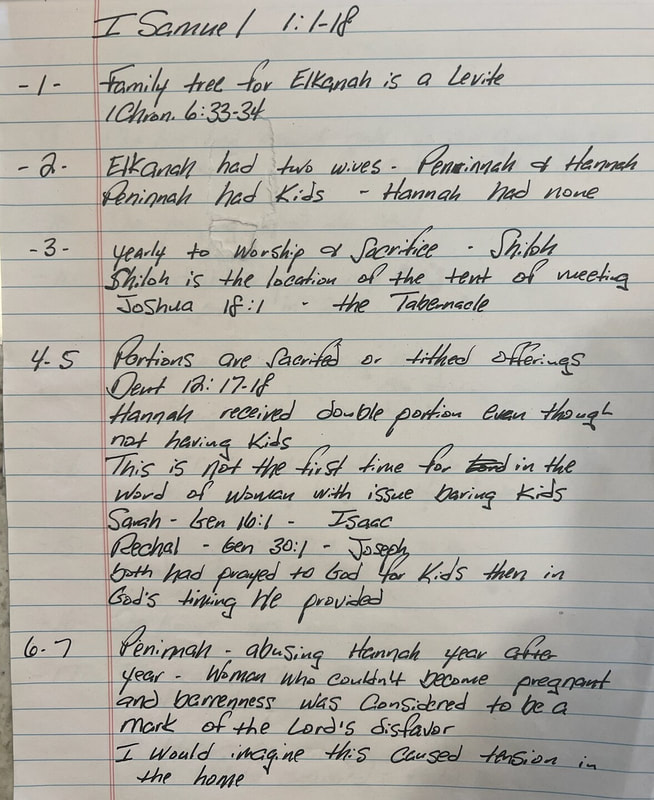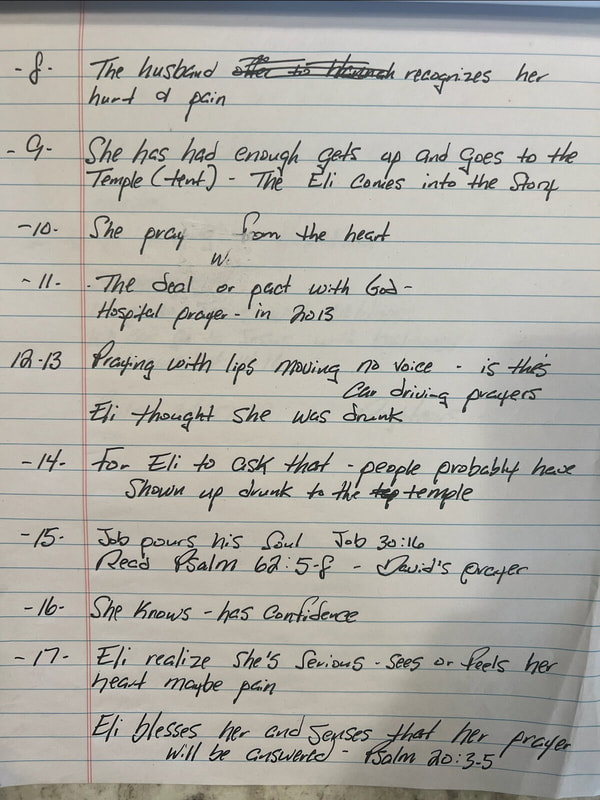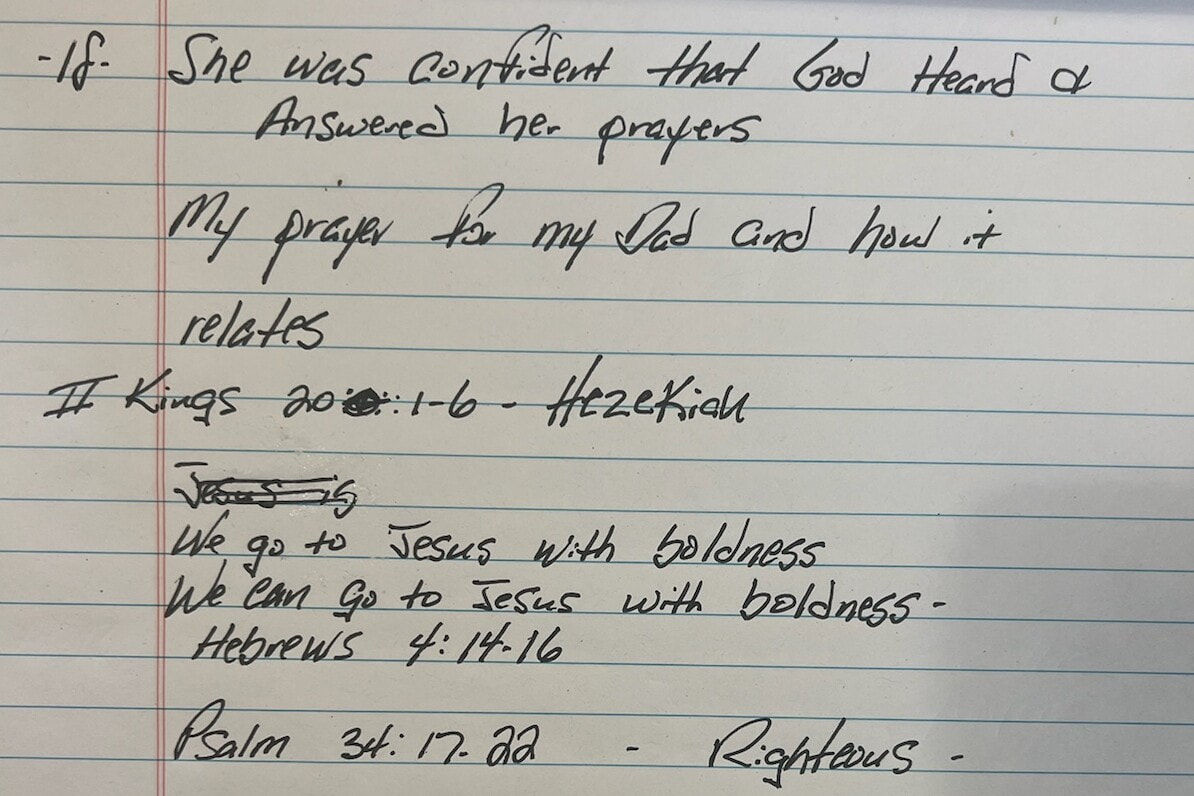| Teacher: Rusty Kennedy Series: Bible Stories |
Rusty's Notes | |
- Chapter 25 – Samuel died
- David and Saul’s hide-and-seek continues similar to the previous week
- David ends up finding refuge with the Philistines but doesn’t really take up their side.
- Chapter 30 – David’s family is taken as hostages by the Philistines, but David rescues them and pummels the Philistines.
- Chapter 31 - recounts the tragic end of Saul and his sons in battle against the Philistines.
- Saul is wounded and takes his own life to avoid capture.
- The Philistines desecrate Saul's body, but the Israelite men retrieve and bury it honorably.
- Saul's death ended David's fugitive experiences, which is estimated to have lasted four or five years at the most.
- 2 Samuel 1-3 – Civil war between the house of and the house of David.
- Abner vs David – Abner died
- 2 Samuel 4 – Saul’s other son dies
2 SAMUEL 4
4 Saul’s son Jonathan had a son whose feet were crippled. He was five years old when the report about Saul and Jonathan came from Jezreel. His nanny picked him up and fled, but as she was hurrying to flee, he fell and became lame. His name was Mephibosheth.[1]
2 SAMUEL 5
4 David was thirty years old when he began his reign; he reigned forty years. 5 In Hebron he reigned over Judah seven years and six months, and in Jerusalem he reigned thirty-three years over all Israel and Judah.[2]
7 Yet David did capture the stronghold of Zion, that is, the city of David.[3]
9 David took up residence in the stronghold, which he named the city of David. He built it up all the way around from the supporting terraces inward. 10 David became more and more powerful, and the Lord God of Armies was with him. 11 King Hiram of Tyre sent envoys to David; he also sent cedar logs, carpenters, and stonemasons, and they built a palace for David. 12 Then David knew that the Lord had established him as king over Israel and had exalted his kingdom for the sake of his people Israel.
13 After he arrived from Hebron, David took more concubines and wives from Jerusalem, and more sons and daughters were born to him. 14 These are the names of those born to him in Jerusalem: Shammua, Shobab, Nathan, Solomon, 15 Ibhar, Elishua, Nepheg, Japhia, 16 Elishama, Eliada, and Eliphelet.
17 When the Philistines heard that David had been anointed king over Israel, they all went in search of David, but he heard about it and went down to the stronghold. 18 So the Philistines came and spread out in Rephaim Valley.
19 Then David inquired of the Lord: “Should I attack the Philistines? Will you hand them over to me?”
The Lord replied to David, “Attack, for I will certainly hand the Philistines over to you.”
20 So David went to Baal-perazim and defeated them there and said, “Like a bursting flood, the Lord has burst out against my enemies before me.” Therefore, he named that place The Lord Bursts Out. 21 The Philistines abandoned their idols there, and David and his men carried them off. [4]
2 SAMUEL 6
12 So David went and had the ark of God brought up from Obed-edom’s house to the city of David with rejoicing. 13 When those carrying the ark of the Lord advanced six steps, he sacrificed an ox and a fattened calf. 14 David was dancing with all his might before the Lord wearing a linen ephod. 15 He and the whole house of Israel were bringing up the ark of the Lord with shouts and the sound of the trumpet. 16 As the ark of the Lord was entering the city of David, Saul’s daughter Michal looked down from the window and saw King David leaping and dancing before the Lord, and she despised him in her heart.[5]
2 SAMUEL 7
4 But that night the word of the Lord came to Nathan: 5 “Go to my servant David and say, ‘This is what the Lord says: Are you to build me a house to dwell in? 6 From the time I brought the Israelites out of Egypt until today I have not dwelt in a house; instead, I have been moving around with a tent as my dwelling. 7 In all my journeys with all the Israelites, have I ever spoken a word to one of the tribal leaders of Israel, whom I commanded to shepherd my people Israel, asking: Why haven’t you built me a house of cedar?’
8 “So now this is what you are to say to my servant David: ‘This is what the Lord of Armies says: I took you from the pasture, from tending the flock, to be ruler over my people Israel. 9 I have been with you wherever you have gone, and I have destroyed all your enemies before you. I will make a great name for you like that of the greatest on the earth. 10 I will designate a place for my people Israel and plant them, so that they may live there and not be disturbed again. Evildoers will not continue to oppress them as they have done 11 ever since the day I ordered judges to be over my people Israel. I will give you rest from all your enemies.
“ ‘The Lord declares to you: The Lord himself will make a house for you. 12 When your time comes and you rest with your ancestors, I will raise up after you your descendant, who will come from your body, and I will establish his kingdom. 13 He is the one who will build a house for my name, and I will establish the throne of his kingdom forever. 14 I will be his father, and he will be my son. When he does wrong, I will discipline him with a rod of men and blows from mortals. 15 But my faithful love will never leave him as it did when I removed it from Saul, whom I removed from before you. 16 Your house and kingdom will endure before me forever, and your throne will be established forever.’”[6]
2 SAMUEL 8
15 So David reigned over all Israel, administering justice and righteousness for all his people.[7]
2 SAMUEL 9
- David discovers Mephibosheth, offers him all of Saul’s fields, and even has Zibah’s (David’s servant) house work the fields.
- David also offers Mephibosheth a place at his table for every meal in Jerusalem.
2 SAMUEL 10
- David continues to do battle and win.
DAVID’S ADULTERY WITH BATHSHEBA
2 SAMUEL 11
1 In the spring when kings march out to war, David sent Joab with his officers and all Israel. They destroyed the Ammonites and besieged Rabbah, but David remained in Jerusalem.
2 One evening David got up from his bed and strolled around on the roof of the palace. From the roof he saw a woman bathing—a very beautiful woman. 3 So David sent someone to inquire about her, and he said, “Isn’t this Bathsheba, daughter of Eliam and wife of Uriah the Hethite?”
- Perhaps Bathsheba was not totally innocent, but that does not lessen David's guilt.
- Nevertheless, the writer, and God, never explicitly blamed Bathsheba for what happened.
- They only blamed David.
- It seems reasonable to assume that she could have shielded herself from view if she had wanted to do so.
- And she was not necessarily completely naked.
- She could have been washing herself using a basin.
- Since David was born in 1041 B.C. and this incident took place about 992 B.C., David was close to 49 years old when he committed adultery.
- "The only recorded speech of Bathsheba, brief though it is.
- Quietly observing the wartime soldier's ban against conjugal relations (mentioned in 1 Samuel 21:4-7).
11 Uriah answered David, “The ark, Israel, and Judah are dwelling in tents, and my master Joab and his soldiers are camping in the open field. How can I enter my house to eat and drink and sleep with my wife? As surely as you live and by your life, I will not do this!”
12 “Stay here today also,” David said to Uriah, “and tomorrow I will send you back.” So Uriah stayed in Jerusalem that day and the next. 13 Then David invited Uriah to eat and drink with him, and David got him drunk. He went out in the evening to lie down on his cot with his master’s servants, but he did not go home.
URIAH’S DEATH ARRANGED
14 The next morning David wrote a letter to Joab and sent it with Uriah. 15 In the letter he wrote:
Put Uriah at the front of the fiercest fighting, then withdraw from him so that he is struck down and dies.
16 When Joab was besieging the city, he put Uriah in the place where he knew the best enemy soldiers were. 17 Then the men of the city came out and attacked Joab, and some of the men from David’s soldiers fell in battle; Uriah the Hethite also died.
18 Joab sent someone to report to David all the details of the battle…
24 However, the archers shot down on your servants from the top of the wall, and some of the king’s servants died. Your servant Uriah the Hethite is also dead.”
- Some other innocent soldiers besides Uriah died because of David's orders. David was responsible for their deaths, too.
26 When Uriah’s wife heard that her husband, Uriah, had died, she mourned for him. 27 When the time of mourning ended, David had her brought to his house. She became his wife and bore him a son. However, the Lord considered what David had done to be evil. [8]
NATHAN’S PARABLE AND DAVID’S REPENTANCE
2 SAMUEL 12
- David had sleepless nights.
- He could see his sin written across the ceiling of his room as he tossed and turned in bed.
- He saw it written across the walls.
- He saw it on the plate where he tried to choke down his meals.
- He saw it on the faces of his counselors.
There were two men in a certain city, one rich and the other poor. 2 The rich man had very large flocks and herds, 3 but the poor man had nothing except one small ewe lamb that he had bought. He raised her, and she grew up with him and with his children. From his meager food she would eat, from his cup she would drink, and in his arms she would sleep. She was like a daughter to him. 4 Now a traveler came to the rich man, but the rich man could not bring himself to take one of his own sheep or cattle to prepare for the traveler who had come to him. Instead, he took the poor man’s lamb and prepared it for his guest.
5 David was infuriated with the man and said to Nathan, “As the Lord lives, the man who did this deserves to die! 6 Because he has done this thing and shown no pity, he must pay four lambs for that lamb.”
7 Nathan replied to David, “You are the man! This is what the Lord God of Israel says: ‘I anointed you king over Israel, and I rescued you from Saul. 8 I gave your master’s house to you and your master’s wives into your arms, and I gave you the house of Israel and Judah, and if that was not enough, I would have given you even more. 9 Why then have you despised the Lord’s command by doing what I consider evil? You struck down Uriah the Hethite with the sword and took his wife as your own wife—you murdered him with the Ammonite’s sword. 10 Now therefore, the sword will never leave your house because you despised me and took the wife of Uriah the Hethite to be your own wife.’
11 “This is what the Lord says, ‘I am going to bring disaster on you from your own family: I will take your wives and give them to another before your very eyes, and he will sleep with them in broad daylight. 12 You acted in secret, but I will do this before all Israel and in broad daylight.’ ”
13 David responded to Nathan, “I have sinned against the Lord.”
Then Nathan replied to David, “And the Lord has taken away your sin; you will not die. 14 However, because you treated the Lord with such contempt in this matter, the son born to you will die.” 15 Then Nathan went home.
- This was the turning-point in the life of David, and the clearest indication that he was different from Saul in the most essential relationship of all, that of submission to the Lord God.
- For that reason he found forgiveness, whereas Saul never accepted his guilt or the rejection that followed from it.
THE DEATH OF BATHSHEBA’S SON
The Lord struck the baby that Uriah’s wife had borne to David, and he became deathly ill. 16 David pleaded with God for the boy. He fasted, went home, and spent the night lying on the ground. 17 The elders of his house stood beside him to get him up from the ground, but he was unwilling and would not eat anything with them.
18 On the seventh day the baby died. But David’s servants were afraid to tell him the baby was dead. They said, “Look, while the baby was alive, we spoke to him, and he wouldn’t listen to us. So how can we tell him the baby is dead? He may do something desperate.”
19 When David saw that his servants were whispering to each other, he guessed that the baby was dead. So he asked his servants, “Is the baby dead?”
“He is dead,” they replied.
20 Then David got up from the ground. He washed, anointed himself, changed his clothes, went to the Lord’s house, and worshiped. Then he went home and requested something to eat. So they served him food, and he ate.
21 His servants asked him, “Why have you done this? While the baby was alive, you fasted and wept, but when he died, you got up and ate food.”
22 He answered, “While the baby was alive, I fasted and wept because I thought, ‘Who knows? The Lord may be gracious to me and let him live.’ 23 But now that he is dead, why should I fast? Can I bring him back again? I’ll go to him, but he will never return to me.”
THE BIRTH OF SOLOMON
24 Then David comforted his wife Bathsheba; he went to her and slept with her. She gave birth to a son and named him Solomon. The Lord loved him, 25 and he sent a message through the prophet Nathan, who named him Jedidiah, because of the Lord.
- The birth of David's and Bathsheba's second son, Solomon (whose name comes from the Hebrew word shalom, "peace," and means "Peaceable" or "Peaceful"), was a blessing from the LORD.
- It demonstrates that God's grace is greater than all our sins
- The chapter ends with David and soldiers taking captive the city of Rabbah.
[1] Christian Standard Bible (Nashville, TN: Holman Bible Publishers, 2020), 2 Sa 4:4.
[2] Christian Standard Bible (Nashville, TN: Holman Bible Publishers, 2020), 2 Sa 5:4–5.
[3] Christian Standard Bible (Nashville, TN: Holman Bible Publishers, 2020), 2 Sa 5:7.
[4] Christian Standard Bible (Nashville, TN: Holman Bible Publishers, 2020), 2 Sa 5:9–21.
[5] Christian Standard Bible (Nashville, TN: Holman Bible Publishers, 2020), 2 Sa 6:12–16.
[6] Christian Standard Bible (Nashville, TN: Holman Bible Publishers, 2020), 2 Sa 7:4–16.
[7] Christian Standard Bible (Nashville, TN: Holman Bible Publishers, 2020), 2 Sa 8:15.
[8] Christian Standard Bible (Nashville, TN: Holman Bible Publishers, 2020), 2 Sa 11:1–27.




 RSS Feed
RSS Feed